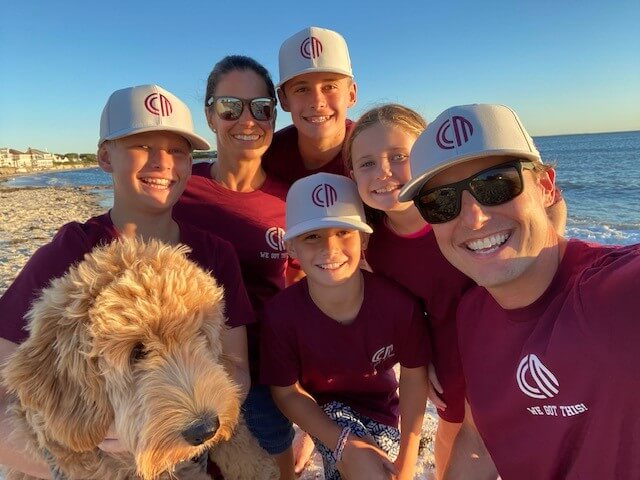Chris Devin never expected to be diagnosed with multiple myeloma at the age of 45 — and being told he had cancer during the COVID-19 pandemic was far from ideal.
But Devin quickly learned that he could rely on his team at Dana-Farber/Brigham and Women’s Cancer Center (DF/BWCC) for the best treatment options. While COVID-19 also presented some challenges — as an inpatient Devin was allowed only brief visits with his wife, Erica, and his kids and parents were not permitted into the hospital at all — he felt confident in his care team to keep him safe while receiving the care he needed.
“I missed my family, but I always felt safe,” Devin says. “My care team had a plan for me, and I knew I was in the best place for my situation and diagnosis.”

A surprising diagnosis
Initially, Chris Devin’s headaches, his doctor assured him, were nothing to worry about. They were likely stress-induced, from anxiety related to COVID-19. Plenty of other people were getting them; he shouldn’t risk coming in for a check-up.
The March 2020 analysis from his primary care physician — delivered on Zoom — surprised Devin, an athletic father of four. Still, he heeded the advice, until his pain grew so excruciating that it necessitated a July trip to the emergency room at Brigham and Women’s Hospital. Only then did Devin finally consent to a full medical workup, which led to a diagnosis: multiple myeloma, a blood cancer that was weakening the bone marrow in multiple spots throughout his body including his skull. Since the median age for the disease is 68, the diagnosis in his mid-40s was a shock to all involved.
Devin immediately underwent five straight days of intensive radiation that stopped his excruciating headaches and readied him to for a clinical trial at DF/BWCC next door. His oncologist Paul Richardson, MD, says he has had an “outstanding” response on the trial, which is evaluating the combination of three drugs and the novel CD-38 antibody isatuximab,
“Chris was a very good candidate for the study because his disease was both high risk and the agents being used were especially suited to tackling his type of aggressive myeloma,” says Richardson.
‘Zero concern’
Due to the stringent safety protocols all clinical trials must undergo before reaching patients, and additional COVID-19 rules in place at DF/BWCC, Devin has been able to keep calm and carry on.
“I honestly have zero concern because of the measures in place the second you walk into the building,” says Devin. “Everybody respects each other, and I never feel like I’m in a compromised position.”
Devin’s wife, Erica, who was a nurse at Boston Children’s Hospital for 15 years, has also been by his side through each step of the complicated, multidisciplinary treatment. In between his face-to-face appointments, much of the couple’s communication with DF/BWCC clinicians is done through telehealth visits. Erica has been right there by her husband to help ask the important questions.
The voice on the other end of these calls is often Richardson, clinical program leader and director of clinical research in the Jerome Lipper Multiple Myeloma Center and LeBow Institute for Myeloma Therapeutics at DF/BWCC. One of the world’s foremost authorities on multiple myeloma, Richardson serves as principal investigator for numerous clinical trials underway to improve patient outcome and increase long-term survivorship.

Leading in new trials
Richardson and his team, comprised of physicians, collaborating research scientists, and research and clinical nursing staff, remains focused on getting new clinical trials approved by the Food and Drug Administration (FDA) and to patients. Although multiple myeloma remains incurable, scientists hope creating trials that deliver two or more drugs in well-conceived combinations will either stop new myeloma cells directly or make it harder for them to grow in a patient’s blood marrow.
The Hematologic Oncology Treatment Center staff at DF/BWCC has effectively handled the challenges of COVID-19, which include an increase in late diagnoses and more serious presentations of disease due to far fewer in-person medical appointments. This was the case for Chris Devin.
“During the first full year of this pandemic, our myeloma group has been responsible for taking the lead on no less than four new FDA-approved agents and treatment modalities that are improving outcomes for Chris and all our patients,” says Richardson. “The myeloma team enrolled as many patients on clinical research trials in 2020 as we did in 2019, not least because the protocols are geared to be pandemic-appropriate. The exceptional teamwork in our group made this possible. All therapies were carefully quality-controlled and quality-assured, which in this new environment is an achievement in itself.”
Focused on the future
These days, as Devin continues on his trial, his biggest problem is impatience. A former college hockey player, he can’t wait to lace up his skates again in adult leagues when his health allows. He is hoping that regular workouts on his Peloton — a Christmas gift from Erica — will get him there quicker. In the meantime, he is back to working fulltime, and each week he makes the half-hour drive to Boston for infusions undeterred by his immunocompromised status.
“Although I would love to get back on the ice this year to play again, I think it is going to be awhile,” Devin says. “With that being said, I am grateful to be in the rinks occasionally when I can to watch my kids play.”
